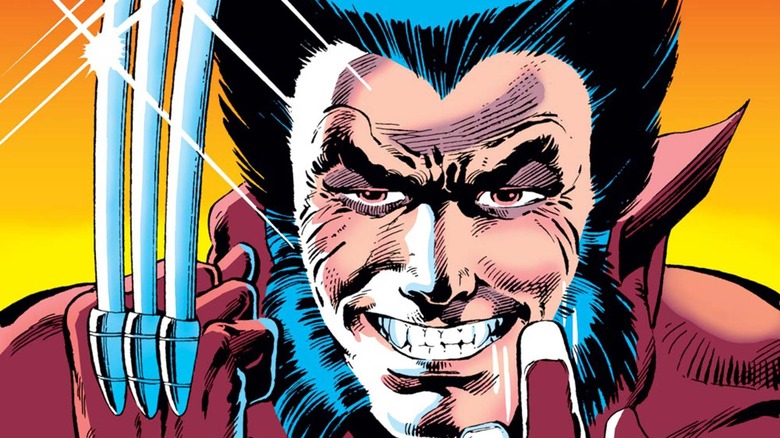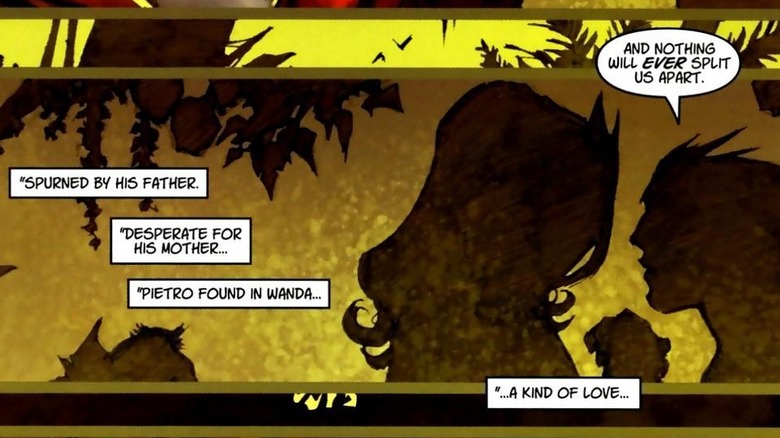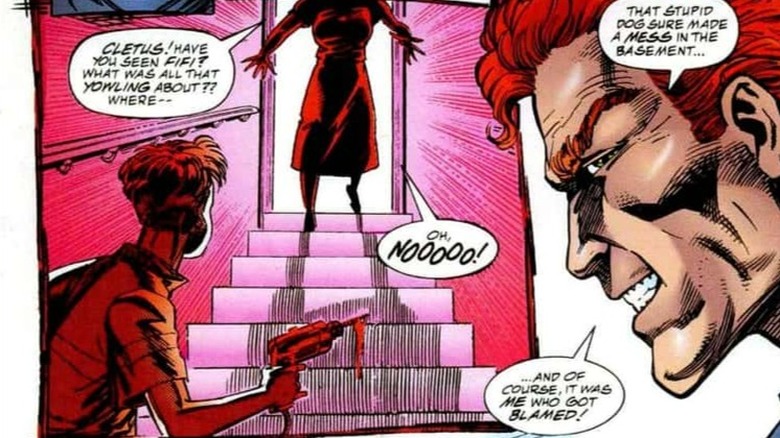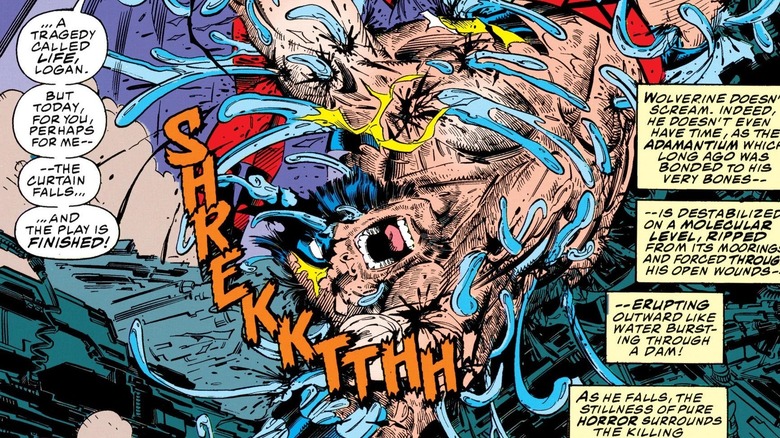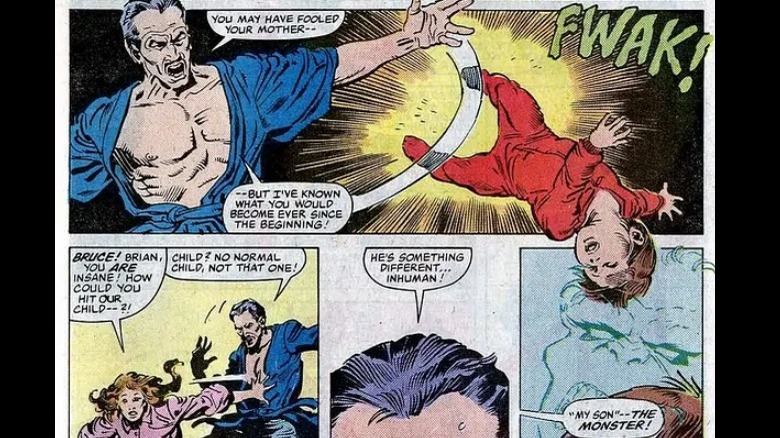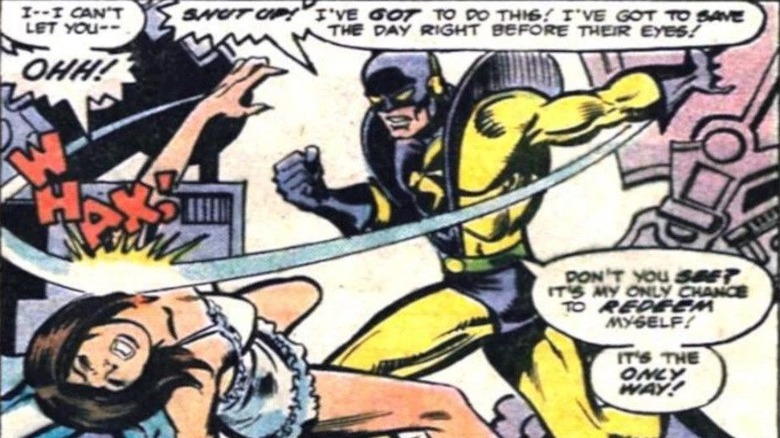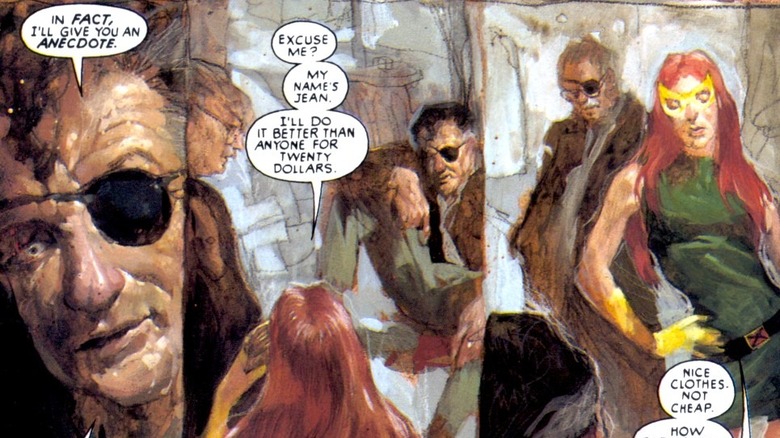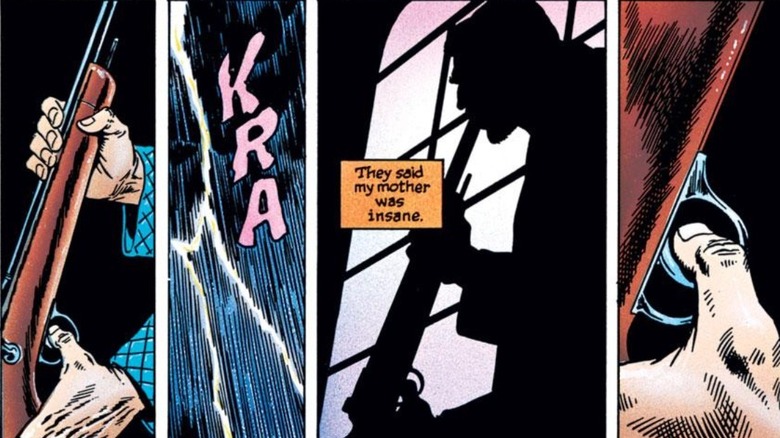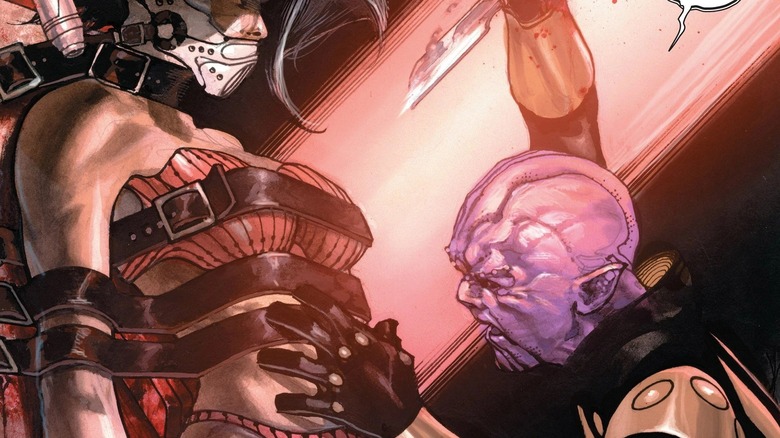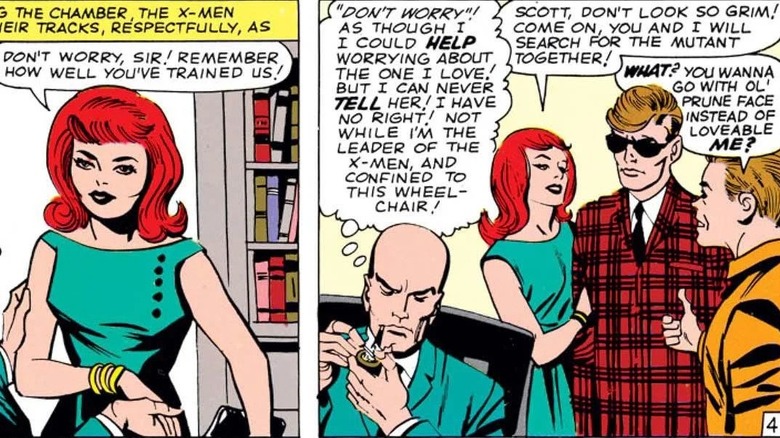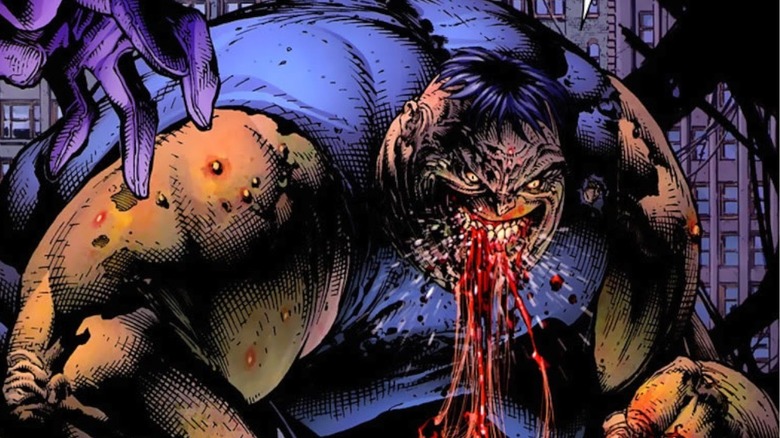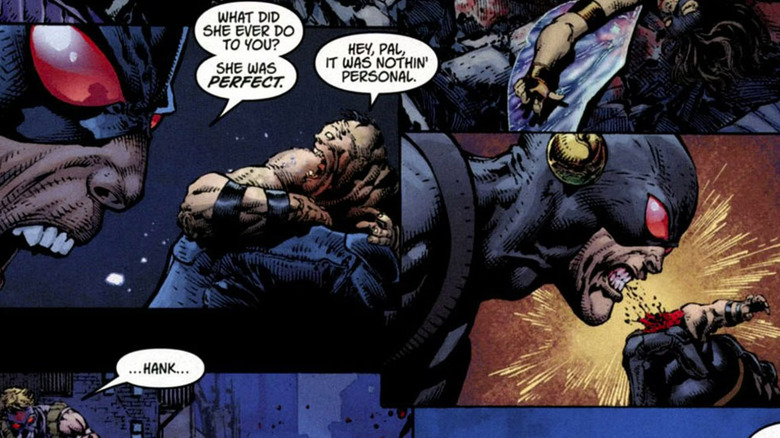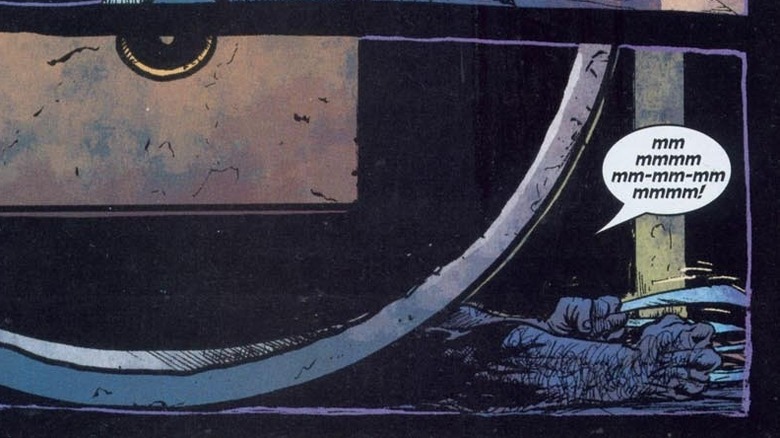Disturbing Comic Book Moments The MCU Will Never Show You
Ever since the release of "The Fantastic Four" #1 in 1961, the Marvel Comics universe has exponentially expanded to include countless beloved heroes, villains, worlds, dimensions, and — most importantly — classic stories. From Peter Parker getting bitten by a radioactive spider to Jean Grey sacrificing herself to save the galaxy to Daredevil's fiery rebirth and more, there are so many fan-favorite moments from the comics that have been immortalized in the pages of Marvel Comics throughout the decades.
Despite these many cherished moments, quite a few scenes have wandered into some surprisingly dark and twisted territory. Some of them have treated the more mature subject matter with respect and sensitivity, giving the reader a poignant lesson about the brutality of life, but others simply crossed the line that separates provocative and exploitative. The Marvel Cinematic Universe has become the highest-grossing movie franchise of all time mainly due to the great storytelling and terrific casting, but also because of the more family-friendly/globally appealing nature of the films and TV shows. With that in mind, it's easy to understand why Marvel Studios will ignore certain plotlines from the source material. With that in mind, let's look at the disturbing comic book moments that the MCU will never show you.
Scarlet Witch and Quicksilver's Incest — The Ultimates 3
An Ultron robot has wreaked havoc in the Ultimates' lives to distract them in order to kill Wanda Lehnsherr/Scarlet Witch as part of a larger scheme. Wolverine meets with the Ultimates to tell them about his history with the Lehnsherr family: Some years earlier, Erik Lehnsherr/Magneto had recruited Wolverine to join his growing Brotherhood, and even tasked him with killing his son Pietro Lehnsherr/Quicksilver, who he thought was weak. Wolverine planned to simply scare Pietro but is caught off guard by Wanda's hex power and sends him running. However, when Wolverine returns, he finds the two siblings engaging in a loving embrace that's more intimate than is typical for most brothers and siblings.
Wolverine's story cuts off there, but it's easy from the art and the dialogue to understand what's really going on between Wanda and Pietro. It's made all the more disturbing when, before the love scene, Pietro remarks that Wanda is looking more and more like their mother every day. Ugh. To top it all off, Wolverine tells of how he first met their mom decades earlier and had a relationship, heavily implying that he's their birth father. The previous volumes of "Ultimates" had their share of shocking moments, but this just felt gratuitous and gross. As a funny/icky coincidence, before Aaron Taylor-Johnson and Elizabeth Olsen played siblings Pietro and Wanda Maximoff in "Avengers: Age of Ultron," they played an actual married couple in 2014's "Godzilla."
Carnage Kills His Dog With A Power Drill — Venom: Carnage Unleashed #1
Before Cletus Kasady became Carnage, he was a disturbed young boy who committed all manner of disturbing acts. In "Venom: Carnage Unleashed," Cletus is having a session with his therapist, Doctor Camille Pazzo, who's trying to delve into what motivated him to dig up the graves of his mother and father. Cletus dodges the question and starts talking about how he believes his mother loved the family dog more than him. The comic then cuts to a flashback to that incident when his mother catches him in the basement with their dead dog on the floor and a bloody power drill in his hand. Of course, Cletus simply tells his therapist that he was blamed for the dog's death, and then changes the subject with a devilish smirk.
Because Sony Pictures has been setting up their own shared universe of Spider-Man supporting characters, it doesn't look like we'll be seeing Carnage in an MCU film in the near future, if ever. However, one thing's for sure: Marvel Studios will never feature a scene of a young Cletus Kasady killing his dog with a power drill. Even if it's largely offscreen like in the comic, the idea itself is far too gruesome to include in a world as hopeful and colorful as the MCU.
Magneto Rips The Adamantium Off Wolverine's Skeleton — X-Men #25
Magneto, previously thought dead after the X-Men's fight with him on Asteroid M, has returned, this time with a group of zealous mutant followers called the Acolytes. When Magneto disrupts the Earth's electrical systems with a powerful magnetic blast, Professor X leads a group of X-Men to Magneto's orbital base (known as Avalon) to defeat him. This strike team engages the Master of Magnetism in a brutal bout which is nearly finished by Wolverine when he stabs Magneto in the stomach. However, Magneto manages to survive Wolverine's vicious attack and, enraged, rips the adamantium from Wolverine's skeleton. This act drives Professor X to his breaking point and he wipes Magneto's mind clean, leaving him in a catatonic state.
We're still waiting to hear from Marvel Studios head Kevin Feige about when we'll see the X-Men enter the MCU now that they own the rights to the Merry Mutants. Even when that happens, don't expect the studio to recreate this painful scene on the big screen. While Wolverine's healing ability certainly reduces the impact of any violence that can be subjected to him, depicting contorting metal bursting from every inch of his skin is still too much to show in a PG-13 movie.
Bruce Banner's Abusive Father Beat Him & His Mother — The Incredible Hulk #312
In this issue, we see a flashback to when Bruce Banner was a young boy before he became the Hulk. One Christmas morning when Bruce was still a toddler, he wanders over to the tree and begins opening one of his presents, which turns out to be a mechanics set. Even at this young age, Bruce is brilliant and able to put it together all by himself. However, when Bruce's father Brian comes downstairs and sees his son's extreme intellect, he flies into a rage and destroys the finished model, then beats up Bruce. Brian believed that his years working in nuclear physics meant that Bruce was a latent monster, and seeing his advanced smarts proved his suspicions correct (in his own mind). Hearing the ruckus, Bruce's mother Rebecca dashes into the room and tries to defend her son, but Brian slaps her in front of him.
This was a painful look into Bruce Banner's past life, but writer Peter David thoughtfully handled the subject of domestic violence, adding new dimensions to Bruce's relationship with anger. It can be easy for casual fans of the character to assume that his complexity is confined to the Bruce Banner/Hulk dichotomy, but revealing his tragic past makes him all the more layered. Still, it would be difficult for the MCU to give Bruce an abusive, alcoholic father, so it's best they avoid the topic altogether.
Hank Pym Slaps His Wife — Avengers #213
After nearly botching a recent mission with the Avengers, the team arranges for a court-martial hearing of Hank Pym (currently in his Yellowjacket identity) to decide what should be done about him. Hank is bitter about their reaction to what he believes was justifiable behavior and decides to get back into their good graces by constructing a robot inspired by his earlier creation, Ultron (as bad an inspiration as there ever was). His plan is to unleash the robot on the Avengers and make it look like it was a random attack, only for him to step in to stop the robot and convince the team to let him rejoin based on his display of heroism. However, when his wife Janet van Dyne stumbles upon his scheme, she tries to get him to reconsider but he angrily slaps her in a fit of rage, resulting in him being kicked out of the Avengers.
According to the issue's writer Jim Shooter, the fateful slap was intended to be an accident, but a miscommunication between him and the artist led to it being depicted as an act of domestic violence. It's such a dark scene that we doubt the MCU will depict it between their version of Hank and Janet, especially since they spent so many years apart with Janet being trapped in the Quantum Realm and more than deserve a happy reunion.
Nick Fury Kills Prostitute Jean Grey — Ruins #1
In this bleak alternate universe, Phil Sheldon (a former reporter for the Daily Bugle) interviews the many figures who were heroes in the main Marvel Comics Universe but are deformed and demented in this one. Phil is working on a book to share with the world where precisely in its history things took a turn for the worse. After meeting such "heroes" as Wolverine and Captain Mar-Vell, Phil interviews government agent Nick Fury who's now a cannibal. Their conversation is interrupted when Jean Grey — wearing her classic green suit — approaches them and offers them a good time for only $20. Fury then casually guns her down, then states that he's going to take a nap, and proceeds to shoot himself in the head.
A strange follow-up of sorts to Kurt Busiek and Alex Ross' hopeful classic "Marvels," "Ruins" gives readers a view of a world where scientific accidents and genetic mutations lead to ugly deaths and hopeless fates. The miniseries is chock-full of disturbing moments that we'll never see in the MCU, but the idea of Nick Fury nonchalantly killing Jean Grey before offing himself is a standout in a twisted take on the Marvel Comics universe.
Kraven The Hunter Kills Himself — The Amazing Spider-Man #294
In this grim story, Kraven — one of Spider-Man's most dangerous foes — hunts down the wall-crawler, beats him in combat, and seemingly kills him. While Spider-Man survived Kraven's attack, he's been incapacitated and buried alive, leaving Kraven to put on his costume and take over his crimefighting duties. However, Kraven's violent nature compels him to beat up criminals far more savagely than Spider-Man ever had. Nonetheless, Kraven believes that because he defeated Spider-Man in combat and is more effective (in his own mind) at stopping criminals, he is the superior Spider-Man. Even when the real Spider-Man arrives for a final confrontation, Kraven believes that he's better than him and has achieved his ultimate goal. Kraven then reflects on his past life and his greatest triumphs as a hunter, places a rifle in his mouth, and pulls the trigger.
Suicide is always a complex subject to address, regardless of the story being told. Writer J. M. DeMatteis gave Kraven's somber end all of the emotional weight it deserved, never letting pure shock get in the way of a story about a man's twisted obsession that goes too far. If Marvel Studios ever get the chance to feature the character in one of their films (he's getting a solo film from Sony Pictures with Aaron Taylor-Johnson in the role), don't expect to see such a classic villain kill himself on the big screen.
Thanos Dissects His Mother While She's Still Alive — Thanos Rising
"Thanos Rising" tells the story of Thanos' early life before becoming one of the most dangerous villains in the Marvel Universe. When he was first born, his mother Sui-San was so disturbed by his unusual appearance that she tried to kill him and was ultimately sent to an institution. Young Thanos was a pacifist, but after a traumatic incident left his friends dead, a girl he had feelings for convinced him to get revenge. Before long, he had become a serial killer who justified his heinous actions as scientific quests. Eventually, Thanos reunited with his mother by strapping her to a table and dissecting her — while she was still alive, no less — to discover what made him a monster, killing her in the process.
Thanos is dead in the Marvel Cinematic Universe, having been killed twice in two different timelines, making this moment from the comics impossible to be portrayed in any future movies. Even if Thanos was still alive or a variant of him was used, a villain coldly operating on his still-breathing mother is way too sadistic to be included in a movie made by a studio that's owned by Disney.
Professor X's Crush On 16-Year-Old Jean Grey — X-Men #3
The first team of X-Men (Jean Grey/Marvel Girl, Scott Summers/Cyclops, Hank McCoy/Beast, Warren Worthington IIIAngel, and Bobby Drake/Iceman) are in the middle of a training session when Professor X interrupts them with an update about a new mutant he has telepathically detected and how to meet this person. At the time, all of the male members had a crush on Jean, but she only had feelings for Scott and chose him to accompany her on this mission. Professor X warns them to be careful, but Jean reassures him that they'll be fine and that he shouldn't worry. This prompts Professor X to think to himself, "'Don't worry! As though I could help worrying about the one I love! But I can never tell her! ... Not while I'm the leader of the X-Men, and confined to this wheelchair!"
Stan Lee previously wrote a lot of romance comics, which may explain why this odd little love triangle appears in a superhero comic. This particular issue was published in 1964, so we can't expect Lee at the time to have today's sensibilities, but it still doesn't detract from the creepiness of a much older mentor having feelings for a teenage girl living and training at his school. It's a safe bet that, when the X-Men join the MCU, Marvel Studios will confine Professor X's interests to women closer to his own age.
The Blob Eats Wasp ... — Ultimatum #3
Following the death of his children Scarlet Witch and Quicksilver, Magneto vows revenge against the entire human race and reverses the Earth's magnetic poles, causing massive destruction around the world. The millions of deaths that ensue catch the heroes of the Ultimate Universe off guard, with many dying in the giant tidal wave that destroyed much of New York City, while the surviving heroes set out to rescue as many people as they can. Hank Pym (now in his Yellowjacket identity) sets out among the devastation to make sure his wife Janet is still alive, with Hawkeye along to help. However, not only do they discover that she's dead, but that the Blob is eating her. Mid-mouthful, the Blob remarks that she "tastes like chicken."
This is one of the most graphic moments in a Marvel comic book, but what else do you expect to happen in "Ultimatum," one of the most infamously hated series ever put out by the House of Ideas? It's already troubling to have her killed off to motivate Hank Pym's final heroic act, and it's made all the worse considering how needlessly graphic and sadistic her death was. The Blob's act of cannibalism is too far outside the bounds of Marvel Studios' typical PG-13 rated films, and the nihilism of having a villain casually eating a hero is too far outside the bounds of good taste.
... And Then Yellowjacket Gets His Revenge On The Blob — Ultimatum #3
Hank Pym had a pretty unhealthy relationship with Janet in the Ultimate Universe: After hitting her and spraying her with bug spray while she was in her miniature form, he spent much of his time obsessed with winning her back. So when Hank discovered the Blob eating his estranged wife, he did what any caring husband would do in that situation: he grew 60 feet tall, picked up the Blob, bit his head off, and spit it out onto the pavement with a sickening squish. To further prove his love for Jan (who, in his rage, he believes can still be saved despite her organs hanging out of her body), Hank attracts all of the kamikaze Multiple Man clones to latch onto his body and is exploded into nothing but a pile of massive bones.
Yeesh. We can't blame Hank for losing his mind when he saw Blob eating his wife, but resorting to cannibalism is a tad over the top. Such a visceral decapitation as that definitely won't make it onto the big screen in the MCU anytime soon, or ever for that matter. We also think that, with Marvel Studios typically giving their protagonist a hopeful bent, they'd have a serious problem with a hero who behaves just as badly as the villain. Two wrongs don't make a right!
The Punisher Parks A Steamroller On Wolverine — Punisher #17
After the Punisher and Wolverine reluctantly team up to take down a mob of little gangsters dedicated to removing the legs of criminals (don't ask), the two antiheroes get into a fight themselves. First, the Punisher shoots Wolverine in the face, leaving him to spend the rest of the storyline with his adamantium skull revealed as his skin slowly heals over it. The Punisher then shoots Wolverine in the groin knowing full well that his "parts" will grow back with his regenerative abilities. However, the Punisher needs to finish his mission without Wolverine getting in the way, and decides to park a steamroller on his face as he yells muffled empty threats at him.
Writer Garth Ennis clearly doesn't care much for superheroes, which should come as no surprise to anyone who's read his series "The Boys" or watched the show it inspired. So it's no wonder why Ennis would treat Wolverine, one of the toughest and coolest superheroes (who's been involved with plenty of moments we'll never see in the MCU) in the Marvel Universe like a dopey punching bag for someone he clearly thinks is a more interesting character. It's a wildly fun story as the Punisher has a blast dishing out the punishment to someone who can take it, but it's highly unlikely that Marvel Studios would ever want to portray such a viscerally brutal yet darkly hilarious story in any future project of theirs.
